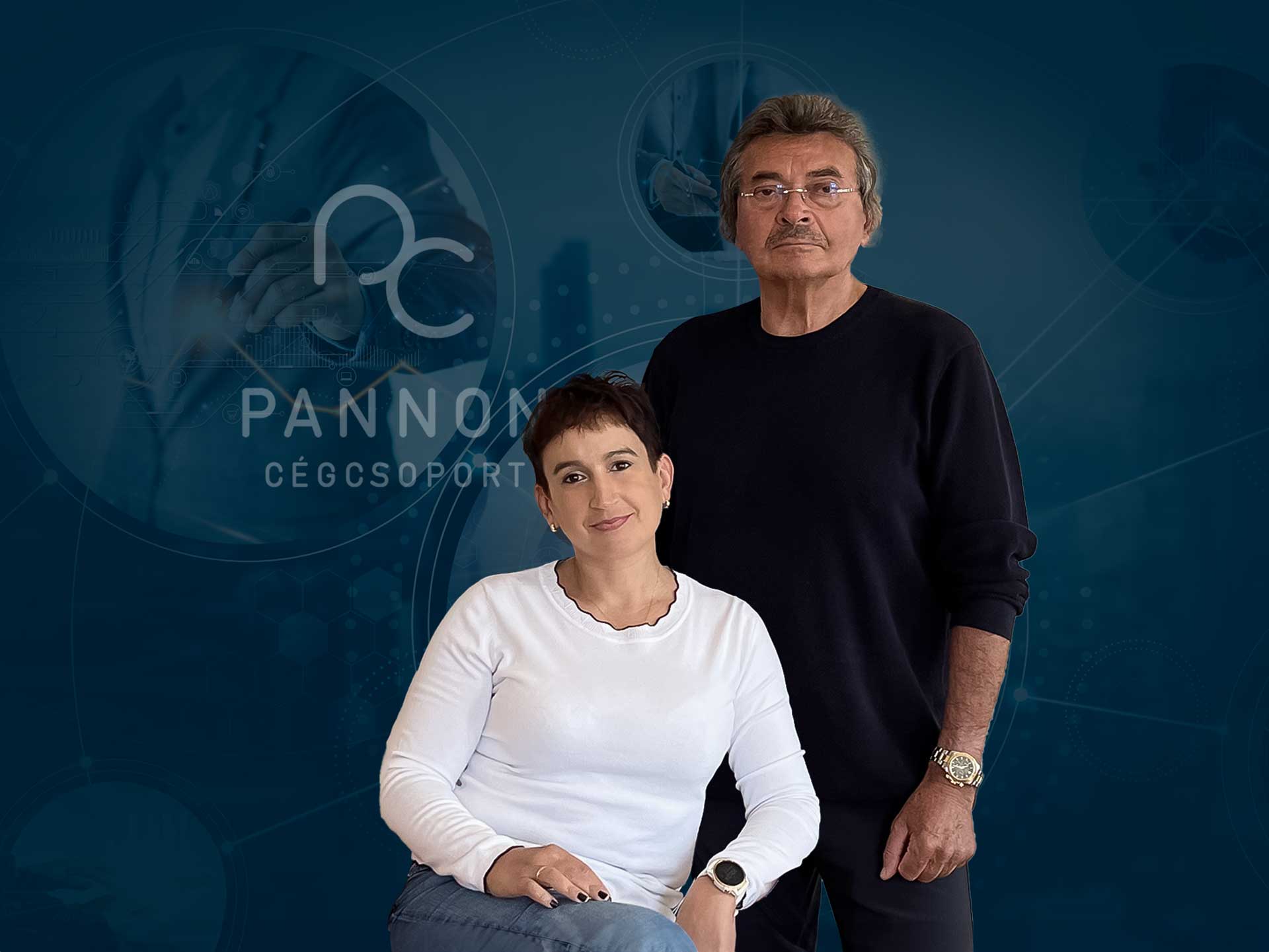How do we make effective business decisions in a business or investment? If we search for this question in today’s online world, we can easily find “quick guides” revealing the five steps to knowledge that will lead to prosperity, dynamism, profitability, and personal development.
Of course, it’s more complicated than that.
The founder of Pannon Group and his daughter Katalin can rightly say that there are few situations in the business world that they have not experienced in the course of their work. Pannon Invest Bt., founded in 1989 (the end of communism in Hungary), was the first company to lay the foundations for the future. Initially, the company offered privatisation consultancy – which was of historic importance in Hungary at the time – and commercial real estate brokerage and development.
In the early 1990s, international investors showed a strong interest in Hungarian businesses that were in need of capital. Hungarian companies wanted to be part of the global economic flow, thirsting for new, innovative technologies and corporate governance practices.
‘I never felt that my father froze in a difficult situation. On the contrary, he was able to see opportunities and act to achieve them,
said the Group CEO, recalling the early days.
Ethology, business consulting and business development
To this day, dr. Katalin Varga remembers how they even turned to sheep breeding and shearing when they needed the extra income. In those years, as a teenage girl, she wanted to be an ethologist, the “new Konrad Lorenz”. She became involved in endurance riding as a young child, and this passion is still a significant part of her life. In addition to her international endurance riding racing career, she serves as a ground jury member at equestrian competitions worldwide.
Eventually, at the encouragement of her father – who said that there was only room for one ethologist in Hungary, a role that Vilmos Csányi then held – she turned to law. However, environmental protection remained a priority for her.
‘Obviously, there are many analytical tasks in ethology that I have been able to use in the course of my work ever since.’ said Katalin, who started teaching financial law after graduating from law school and delivering lectures on the area closest to her heart, environmental taxes.
Her keen interest in the animal kingdom and her observation of animal behaviour – evolutionary behaviour too – gave her a lot of experience which she could use, for example, in her negotiation techniques.
– It is always worth paying constant attention to the spontaneous reactions of your negotiating partners. It is not easy to focus on achieving business goals and perceive the behaviour of the negotiating partner at the same time – she explained.

Dr Katain Varga and Dr Jenő Varga, owners of the Pannon Group
But let’s not get ahead of ourselves! Her father later became primarily involved in the liquidation and reorganisation of companies, an activity that laid the foundations for the future of the Group. He saved many strategic companies that had a major impact on their immediate social environment, such as MiZo and the meat-producing companies in Pápa and Gyula.
‘These companies were saved, the creditors got their money, the liquidation was, in most cases, transformed into reorganisation, operations were continuous during this period. For me, saving a significant number of workplaces was always particularly important.’ said dr. Jenő Varga, recalling these years.
He added that this process was not only driven by numbers, but also by building trust with suppliers, creditors, customers and employees.

How did the Mechanical Laboratory in Pécs become Nokia?
The Nokia story:
from liquidation to a success story
In the early 1990s, an Italian professional investor bought the Mechanical Laboratory Company in Pécs to produce monitors with the existing workforce. In less than two years, the company was in irredeemable decline, with unpaid bills, struggling employees and high debts. Liquidation proceedings became inevitable.
Then, the founder of today’s Pannon Group, dr. Jenő Varga entered the stage and, after a thorough assessment of the situation and calculations,, started to correct the damaging processes.
We had to find a buyer who could not only produce 2500-3000 monitors per day but also sell this amount daily on the international market.
– he said.
They conducted a thorough data collection to determine which companies might need such manufacturing capacity. In the end
- they found 68 relevant companies and contacted them (remember, fax was the fastest way to communicate in business back then);
- 32 of these companies responded;
- they managed to organise a first meeting with 16 companies;
- and they had concrete negotiations with two companies.
Nokia won. At that time, the Yugoslav Wars was rageing right next to the southern borders of Baranya County, scaring potential investors. Eventually, the factory became a major employer in the area and enjoyed successful years of business. Its legacy can still be felt in the city today.
Division of labour, generational building of father and daughter
After finishing her studies at the University of Pécs’s Faculty of Law, Katalin Varga started to teach there. Meanwhile, she completed an MBA at the Faculty of Economics. Of course, the question of business knowledge and experience, as well as the legacy of relationships, is likely to arise at one time or another in the life of any multi-generational business. The vast majority of the companies set up when the communist regime ended in Hungary have typically reached the point where they have to decide what to do next. In the last 10-15 years, there has been a growing literature on generational change in Hungary.
Well, that’s exactly it because we’ve never talked about generational change but rather generational building or generational cooperation.
– said Katalin’s father. Jenő Varga and Katalin are not thinking in terms of a generational change but of a division of labour. They complement each other, are there for each other, and continuously work on perfecting this cooperation.
‘It’s not about handing over tasks in a planned—or even spontaneous—way but about both of us constantly reacting to and working on new challenges as they arise. We try to ensure that we give each other the right quality and depth of information about the tasks we don’t do together.’ Katalin Varga added.
‘When Kata was younger, I always made sure that she never felt pressured to join the business. I never pushed her, especially because she saw how much work I had to do daily. However, I have repeatedly told her that she will become an owner sooner or later.’ said Jenő Varga, giving another piece of advice for generational cooperation.
The daughter sees herself as fundamentally restless, and her commitment to environmental law has remained strong since the 1990s. Her father has accepted this, which has allowed her to gain experience in the international arena in a field close to her heart.
‘At that time, I was very impressed by the experience of teaching; it meant a lot to me to hold the attention of many people, to pass on knowledge’ said Katalin Varga.
‘Besides all my work, teaching is still important to me. I teach endurance riding at the Hungarian University of Sports Science and the University of Veterinary Medicine, and one of my favourite things is simulating a company start-up with students at the University of Pécs during an event called Hackathon.
In fortunate cases, there are moments in the generational change or generation building of businesses worth seizing. Fortunately, this was the case for Jenő Varga and Katalin.
We easily forget now, but the global financial and real estate crisis in 2008-2009 could have been a major turning point, especially for a partly specialised business.
‘We had to sacrifice a lot’ recalls Jenő Varga.
‘Like a GPS navigation system, we had to “recalculate” our business over these two years. What could we do to save our business? I toyed with the idea that we could become a small company again, but thanks to continuous strategic thinking and analysis, we were able to rebuild. Of course, Kata quitting teaching and becoming fully integrated into our business was a meaningful change.’
The Chinese interpret the term “crisis” differently. For them, the word “crisis” has double meaning: one is danger, and the other – the more important one – is opportunity. During these difficult years, the management of the Pannon Group has gained considerable business development and empirical knowledge.
The crisis, therefore, opened up new areas, but first, they had to identify them. From then on, father and daughter were in daily contact, exchanging information, researching and analysing.
‘I had to ask myself: What is Kata better at than me? Then I realised it didn’t matter because even if she doesn’t do things the way I would, it’s never better or worse; it’s just different.’
The most important thing is that she feels comfortable in this role; she earns the trust of others, and the rest is the result of negotiations and internal discussions.
– said Jenő Varga – giving an important piece of empirical advice on the generational dilemmas of businesses. He who believes that emotional and contextual intelligence is now essential in business, supported by thorough, even mathematically accurate data collection and analysis.
Effective business consulting and development:
„I want to know everything!”
Old folks may remember the Soviet cartoon of the time, in which a young boy eagerly seeking knowledge cracks open a large walnut with a giant hammer, “releasing” the knowledge he seeks. This young boy is always asking questions, wanting to know everything.
Strategic business consulting and business development are similar. You must always know everything about a given industry, political, economic, social situation, as well as your background. Unsurprisingly, this requires constant learning, whether online information gathering or a formal form of education.
That is why, in 2023, Katalin Varga enrolled in the Executive Diploma in Global Business programme of the University of Oxford’s Saïd Business School. Despite the emerging multipolar global financial system, as Zoltán Pozsár has put it, up-to-date and practice-oriented knowledge is still only available in the world’s leading educational centres.
‘At first I was surprised at the intensity of the lectures. The curriculum is very challenging but exciting and relevant. A thorough knowledge of the 600-800 pages of pre-work for each module is vital at the lectures. According to the rules of the University, students have to speak as much in class as the lecturer. During lectures and assessments, the Business School focuses on critical thinking, creativity, teamwork, and other soft skills. These were the qualities taken into account during the admission process as well. I also like that they consciously select candidates from all over the world.’ said Katalin Varga. She believes, that in addition to acquiring fresh and up-to-date knowledge, the development of business contacts is also an important objective.
In addition to the above, Pannon Group is involved in tourism development, agriculture and the insurance sector.